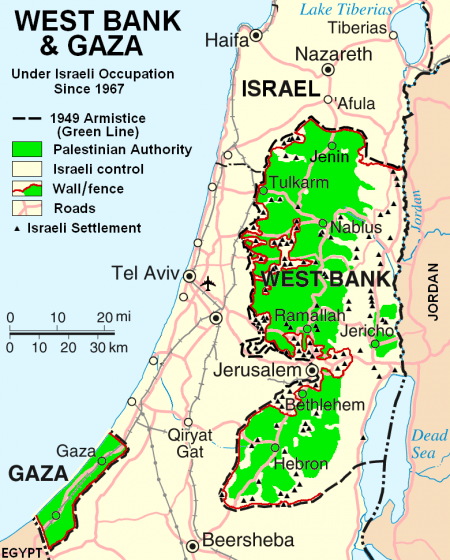By Robin Rothfield
This article by AJDS Executive Committee member Robin Rothfield appears in the print version of the Australian Jewish News – July 26, 2013.
—–
The debate at the plenum of the Jewish Community Council of Victoria held on 3 June 2013, concerning the activity of the Australian Jewish Democratic Society relating to the settlements, suggests that there may be a lack of information about the very real harm which the settlements and the occupation do to the prospects for a peaceful resolution of the Israel Palestine conflict.
In 2007 while attending the wedding in Israel of my niece, I took the opportunity to visit the West Bank accompanied by a volunteer from Machsom Watch.
Some of my observations were as follows:
a. The town of Kalkilya, with a population of 20,000, is almost completely enclosed by a concrete separation barrier 8 metres high. We stopped at the gate to a neighbouring village Ras Atiya which is also surrounded by the barrier, this time a barbed wire fence, with the villagers having limited access controlled by the army. The villagers have to go through 2 checkpoints to get to market at Kalkilya. And why is this? So that the residents of the Jewish settlement on the hill Alfei Menashe have unfettered access to Israel. The Supreme Court had handed down a ruling two years earlier to move the separation barrier so that it would lessen the disruption to the lives of Palestinians, but the ruling had been ignored and today nearly 6 years later the barrier has still not been moved.
b. The gate to the village closes in the evening and for emergency medical treatment the villagers have to shout to the soldiers who sometimes don’t come out. We saw a school age boy taking his donkey across rough ground, apparently going to fetch water for his family. Israel has taken control of all water supplies in the West Bank so that the settlers have water for their gardens and their swimming pools while many Palestinians have to travel to get water for their everyday needs.
c. A farmer, Al Rafiq was at the gate. He had brought 2000 week old chicks from the village and wanted to sell them elsewhere but the soldiers would not let his vehicle pass. He had been waiting for permission to cross with his chicks for two hours in the sun and likely to die from the heat..
d. We saw a school age child aged between 10 and 12 years waiting with some trepidation at a gate some 50 metres from the checkpoint for a signal from the soldier to proceed. Daphne, our tour guide, had words with the soldier who then allowed the child through. But Daphne explained that had she not been there the soldier would have made the child wait half an hour in the hot sun.
e. We drove along roads which only Israeli cars are permitted to use, and noted the sharp deterioration in the quality of roads which Palestinians are permitted to use. Israel does not maintain Palestinian roads.
f. Daphne told us the following disturbing anecdote. One day while driving she came across a stranded religious Jew and a Palestinian standing next to one another. The religious Jew had run out of petrol. The Palestinian, who had stopped to help the Jew, explained to Daphne that there was a settlement nearby which could sell petrol but that he, the Palestinian, would not be permitted entry. Therefore Daphne should go there and buy petrol on behalf of the religious Jew. She agreed to do this. When Daphne got to the settlement and bought the petrol, the settler who had sold it to her said, after realizing she was from Machsom Watch: “If it was for you, I wouldn’t help you even if you were dying.” Another settler said to Daphne: “A pity your family survived the Holocaust.”
g. At Elkanah we saw the house of a family of 8 Palestinians cut off from their village, Mas’ha, by the separation wall. The wall has been positioned for the convenience of the Jewish settlers below the offending house so as not to obstruct the settlers view from the hill over the valley. The family has a key to access the village through a yellow gate in the wall until 8 pm but none of the villagers are allowed to cross the wall and so the family cannot receive them as visitors. The positioning of the wall has thus made this family virtual prisoners in their own home.
h. At the Hawara checkpoint we saw the fear in the face of a 10 year old boy who had to leave his father’s car and raise his shirt to cross the checkpoint on foot.
I was spared the more gruesome episodes of settlers burning down olive trees and committing acts of violence against the villagers but saw enough to convince me that the settlements must go if there is to be any chance of a peaceful outcome of the Israel – Palestinian conflict.
Settlements must go to give peace a chance

